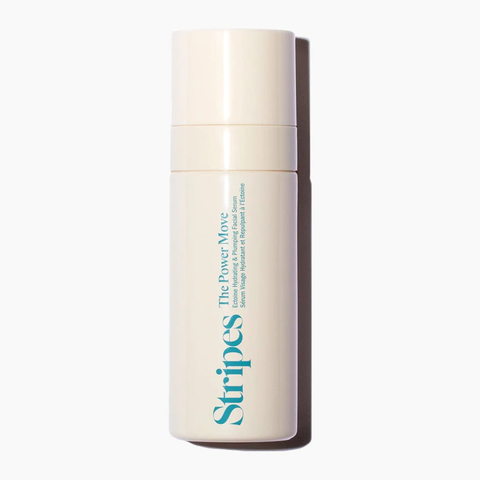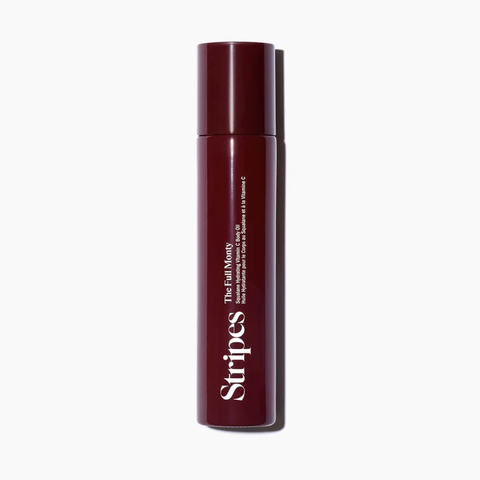Along with her list of notable accomplishments—including raising two children and earning two Oscar nominations—actress Naomi Watts is now adding advocate to her résumé with the creation of menopausal beauty brand Stripes. Officially launching October 18 in partnership with Amyris, Stripes’s mission aims to improve the conversation around menopause and features a range of products like a cooling face mist, hydrating vaginal gel, and probiotic supplements, geared toward women experiencing what the brand calls “the change.”
Stripes isn’t Watts’s first foray into the beauty space, as she initially co-created the online retail platform ONDA Beauty in 2014. “We have up to 80 different brands at a time,” she tells BAZAAR.com. “I was really into skin care and always have been into wellness and good health. And it just became glaringly obvious that there wasn’t a place for women of this exact age group to see themselves reflected in storytelling and in media. It should be a time when you feel bolstered, because we’re all going to go through it at one point or another. Through storytelling, I think you create the power to change things; this is a subject that’s been long overdue and needs meaningful examination and innovation, because it really should be a vibrant time of one’s life. This is not the end.”
The actress adds that the idea for Stripes developed after experiencing the physical and emotional transition of menopause for herself. “Stripes came about because it was very much reflecting my own story of feeling a bit frustrated and alone during this period of time, which was around my early 40s just after I had kids,” Watts says of her journey. “And I had already walked through a period of secrecy and shame surrounding the fertility time, so I was determined not to walk through that secrecy and shame again. In fact, I didn’t even really know how to talk to doctors about it, how to talk to friends about it. And whenever I’d give it a gentle try, I didn’t feel like it was open. So it just kind of struck me, and the fact that it’s left out of compensation and education, it’s just mind-boggling.”
The entrepreneur and star intends for Stripes to become not just a community for women, but also a resource for younger generations to have an open dialogue about “the change” as well. “It feels like an extension of storytelling, which is the business I’m already in, bringing people together to create feelings and seeing themselves reflected, so it feels like that, only a little bit more personal.”
Ahead, BAZAAR.com catches up with Watts to learn more about her thoughts on aging in Hollywood, taking care of one’s mind and body in their 40s and beyond, and her must-have Stripes products.
What surprised you most about transitioning through menopause?
Now that I’ve been with it for a number of years, I feel a much better version of myself. It’s the beginning stages, where you really don’t know what’s going on with the physical and emotional changes, and I’m now on the other side of the worst part of it.
The beginning is all transitional: Your hormones are up one day and down the next, and it’s all pretty much a big ol’ shit sandwich. But the good news is for younger generations is that we’re opening the doors now to breaking down the stigma and normalizing the conversation so you can know what’s coming and have a great support network. And doctors are now specializing in this, because half the population will go through it; before there were all types of theories conflicting about what the right thing is to do.
Is there anything you weren’t fully prepared for?
I knew that my mother went into what’s considered early menopause, since she told me her last period was at age 45. But I didn’t know that there were a whole lot of years that she felt alone and challenged by that time. And I said, “Why didn’t you tell me?” and she said, “Well, it’s a conversation I never had with my mother because she never had it with hers.”
We’ve been passed this code of silence from generation upon generation, which has led us to believe that we should suck it up and cope. The fact that there’s been no education there gives us a terrible message that basically tells us, “It’s the end, you’re invisible from here on out, you are not relevant,” and that’s a travesty. I want to approach it from an intergenerational angle to create empathy for our elders that did suffer in silence with no community, medical help, or anything. And also, throw the ladders down to the younger generations, so that they can feel comfy with asking for help.
How did your partnership with Amyris come about?
I knew I wanted to work with a partner, because I still have my day job, which I enjoy very much. I’d heard about Amyris a few times in the beauty space having come from ONDA Beauty, and I knew I wanted to work with a lab that was only going to be using clean ingredients. I knew they were creating formulas for other brands, but I didn’t know they were creating brands from the ground up, so I basically did a cold reach out.
They were definitely a company that believed in being clean and sustainable, and had the right alignment in every way, as well as great resources. I reached out literally at the beginning of the pandemic and talked to them about the idea, vision, and purpose of the brand, and they latched onto it right away. I would say it’s come about pretty quickly, but it’s also been a solid 18 months, nearly two years, since that call.
What are some self-care practices that you use to ease more into menopause?
Firstly, talking about it with friends. Even after 18 months of really researching it, there are so many different theories to learn and so much mystery and conflicting information. So there’s a lot more to learn, and comparing those stories with friends and getting their experiences of the process helps.
I also I feel like humor is an important piece of it, and definitely gets you past pain and through awkward moments. That’s why on our platforms we try to bring in humor to show people that we can laugh at ourselves and it also isn’t the worst time of our lives. And we’ve done that with, like, the naming of each product. Any little way that we can help make it a little less unbearable.
Speaking of the products, what would you say is your most-used Stripes item right now?
I’m really deeply in love with the serum. It can live on its own; it doesn’t have to have a moisturizer over it. It’s packed with five different kinds of hyaluronic acid, mushroom extract, and really great for strengthening the skin barrier but also creating deep hydration on a cellular level. That’s my number one favorite.
But I also really love The Full Monty, which is our body oil. It leaves such a beautiful, velvety finish, and is nongreasy, plus has plenty of antioxidants. And the smell is just divine. Interestingly, you become more sensitive to smell when you are in menopause, and what you used to love before, you suddenly can’t tolerate. So the smells are subtle, but they’re just enough. I tend to not wear perfume as much unless I’m going out. I don’t want to wear perfume every day like I may have done at different times of my life, so the body oil gives you that nice little scent.
Of course, you’ve been in Hollywood for a number of years. In what ways, if at all, have you seen the industry shift from when you started to now, in how it makes room for aging?
The industry has certainly changed. When I started getting active in a real way, I was in my early 30s, which was considered quite late by Hollywood standards. I was told, “Oh, it’s all over at 40, so you better get going and not waste any time; just work, work, work.” And that was so scary. I thought to myself, “Why wouldn’t there be stories out there about women in their 50s and upwards? Like, they’re still around, I’m seeing them everywhere.”
The theory was, I think, someone said, “Oh, well, when you get to that point, when you’re unfuckable, that’s when the stories dry up.” And I went, “Well, what do you mean by that? What does that mean?” And I went away and tried to do my own computing and examining of that statement, and it pretty much said when your reproductive organs are no longer working, that’s when you’re not sexy, which is absurd. There are so many great stories to be told of women at this age bracket and onwards.
So, I do feel like the industry has changed, and I think the Internet has been definitely a cause of that change—certainly for women in menopause taking it into their own hands of being their best advocates. Once you open that door, a little crack, we’re all ready to come out yelling, and I think that sort of passed on to Hollywood; we’re seeing those stories more reflected.
Do you have any thoughts on Hollywood’s current depiction of menopause?
We’re still getting there. It’s been such a dirty word to this point, but aging has certainly been no stranger to Hollywood and conversations. But now, there’s more detail around that. I just hope that with breaking the conversation open, there’s just going to be more compassion, more empathy, and greater understanding.
I don’t want to be regulated to just playing the crazy, mad villain, you know? Although that’s a great part, too, I’d be open to it. But that’s not the only thing we are. We should be respected for cumulative experiences. But I’ve seen a shift. It used to be 40 that they’d say your career dries up, but now it’s like the number’s not there anymore. I think there’s less accessibility, less abundance for those kinds of stories to be told, but they’re definitely more of them than there used to be.
Stripes, whose products start at $40, is available to shop now online at iamstripes.com.
Tiffany Dodson is the Associate Beauty Commerce Editor at Bazaar.com where she covers all things beauty and shopping, including new product drops and can’t-miss sales. Her work has previously been featured in SELF, Bustle, and Teen Vogue.
Naomi Watts Wants to Talk About Menopause
Newspaper Updates PH


0 comentários :
Post a Comment